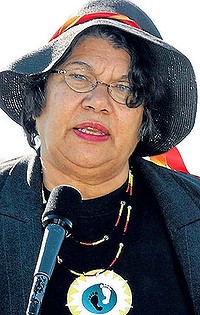Ningali Cullen
Ningali Cullen | |
|---|---|
 | |
| Born | 1942 |
| Died | 10 May 2012 Canberra |
| Nationality | Australian |
| Other names | Ngingali Cullen, Audrey Kinnear, Ningali Cobby |
| Known for | Aboriginal activist |
Ningali Cullen (1942–2012) was an Aboriginal activist and co-chair of the National Sorry Day Committee.
Early life
Cullen was born at Ooldea, South Australia in 1942.[1] Along with her brother and one of her sisters, she was taken from her family at the age of 4.[2] Cullen and her brother were taken to the Koonibba Lutheran Mission Home near Ceduna, South Australia.[1]
She was educated at Concordia College and was their first female Aboriginal student.[1]
Nursing career
After finishing her schooling, Cullen trained as a nurse at the
During this time Cullen married Lawrie Kinnear. The couple had three children.[2]
Career as an activist
Cullen reconnected with her mother May Cobby, a Yankunjatjara woman, for the first time since she had been taken, after discovering that Cobby was living near Port Augusta.[2] This emotional reunion was cut short by Cobby's disappearance in 1965 from Port Pirie.[2]
Cobby had been waiting at a roadhouse with her daughter Mabel, the only one of her four children not to be taken from her as a child.[2] Staff at the roadhouse called the police, who came to ask May and Mabel to leave the roadhouse.[3] Mabel was taken into custody by the police and May was left at the roadhouse, despite Mabel's protests.[3] Cullen, who had been at work, later arrived to find that May had vanished.[3] She demanded an inquest into May's disappearance, but no trace of her mother was found.[1]
Cullen later stated that her mother's disappearance pushed Cullen to become an activist for her people.[4] She worked to improve access to healthcare in Aboriginal communities and became a prominent member of the Port Augusta Aboriginal community.[1] She was involved in projects including the National Trachoma and Eye Health Program[5] and also worked in drug and alcohol rehabilitation.[3]
Cullen was elected to the Nulla Wanga Tjuta Regional Council, part of the Aboriginal and Torres Strait Islander Commission (ATSIC), in 1990.[1] Two years later she moved to Canberra to take up a job as Health Policy Officer for ATSIC, later moving to the Office of Indigenous Affairs.[1]
National Sorry Day
A million people have said sorry. At last, many non-Indigenous Australians understand what we have endured. Now we can move on to healing.
Ningali Cullen[6]
Cullen was a member of the National Stolen Generation Working Group established following the release of the Bringing Them Home report on 26 May 1997.[7] She was responsible for the Journey of Healing initiative launched on 26 May 1996,[2] and following Carol Kendall's resignation due to ill health was elected Co-Chair of the Committee.[7]
In 2000, over 250,000 people marched across the
Later life
Ningali married her second husband, Derick Cullen, in 2003. She reconnected with her daughter Ali Cobby Eckermann, who had been adopted shortly after birth.[10]
Cullen died on 10 May 2012.[2]
References
- ^ a b c d e f g h i j "Cullen, Ngingali (1942 - 2012)". The Australian Women's Register. National Foundation for Australian Women. Retrieved 10 May 2014.
- ^ a b c d e f g h i j Bond, John (26 May 2012). "Champion of healing and Sorry Day". The Age. Retrieved 10 May 2014.
- ^ a b c d Bond, John. "'Our people aren't victims any more'" (PDF). Newsbriefs June 2012. Australia/Pacific Centre for Initiatives of Change. Archived from the original (PDF) on 12 May 2014. Retrieved 10 May 2014.
- ^ Levy, Wendy (25 May 1996). "Standing Tall and Feeling Proud". The Canberra Times., quoted in "Cullen, Ngingali (1942 - 2012)". The Australian Women's Register. National Foundation for Australian Women. Retrieved 10 May 2014.
- ISBN 978-085575-665-9. Archived from the original(PDF) on 4 June 2014. Retrieved 10 May 2014.
- ^ Quoted in Brodtmann, Gai. "STATEMENTS BY MEMBERS Cullen, Ms Ningali SPEECH" (PDF). Commonwealth of Australia. Retrieved 10 May 2014.
- ^ a b c "The History of NSDC". National Sorry Day Committee. Retrieved 10 May 2014.
- ^ "Sorry Day and the Stolen Generations". Australian Government. Archived from the original on 12 May 2012. Retrieved 10 May 2014.
- ^ Bond, John. "The Struggle for Truth, Healing and Justice: some creative examples by John Bond". Balfour Project. Retrieved 10 May 2014.
- ^ "Mother's Day 2016: Until I met mum, I didn't know who I was". NITV. Retrieved 25 February 2024.
